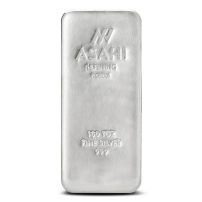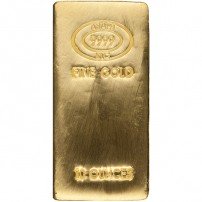



While the opening of a new private mint is rarely attention grabbing in the minds of numismatists, it is worth paying attention to the creation of an all-new refining operation when it happens as the result of the closure of one of the world’s foremost precious metals companies. Johnson Matthey has been in the refining industry for 160 years, and as of 2015, it has sold its gold and silver refining business to the newly formed Asahi Refining Inc.
A quick glance and you’ll see that Asahi Refining seemingly sprang up overnight, creating London Bullion Market Association (LBMA) bars with efficiency and ease. In reality, Asahi Refining was able to absorb the operations of a well-established refining and precious metals production line owned by Johnson Matthey.
Johnson Matthey is a British multinational company with specialty chemicals and sustainable technologies. Headquartered in the United Kingdom, the company was founded in 1817 in London. The roots of Johnson Matthey date back even further in the precious metals industry, with founder Percival Norton Johnson setting up a gold assayer’s business in London in 1802. Fast forward to 1851, and he joined forces with George Matthey to create Johnson Matthey. The company was appointed an Official Assayer & refiner to the Bank of England that year, establishing a refining business that lasted for 160 years.
Over the course of Johnson Matthey’s existence in the precious metals industry, it established a track record for refining and producing LBMA good delivery bars in both gold and silver. However, in recent years the company made the decision to divest from the industry, and sought a seller to purchase its existing precious metals infrastructure.
The parent company of Asahi Refining is Japan-based Asahi Holdings. The company was founded in Tokyo in July 1952, and currently has two major corporate centers in Japan. One office is located in Tokyo and the other in Kobe. The company has business lines that extend in recycling and sales of precious and rare metals (gold, silver, palladium, and platinum in particular), the treatment of industrial wastes, detoxification of hazardous wastes, and analysis for rare and precious metals.
Asahi Holdings increased its profile and operations within the precious metals industry in 2014 when it agreed in principle to purchase Johnson Matthey’s holdings in gold and silver refining. The deal was announced in December 2014, but not officially completed until July 2015. Asahi Holdings agreed to pay Johnson Matthey $186 million (USD) in cash to complete the purchase of its facilities, but did not acquire all of Johnson Matthey’s previous facilities.
In the terms of the sale, Asahi Holdings took control of Johnson Matthey’s refining operations at its facilities in both Salt Lake City, Utah (USA) and Brampton, Ontario (Canada). A third facility in the Johnson Matthey operation, in St. Catharines (Canada) was also included in the deal. The facility in St. Catharines is an investment casting services center.
Although the deal was considered official in July 2015, Asahi Holdings began operating out of the Salt Lake and Brampton facilities in March 2015. These two facilities have combined under the operational name of Asahi Refining, while the St. Catharines facility will operate as Niagara Investment Castings, a division of Asahi Refining Canada Limited.
The very first products struck by the newly formed Asahi Refining Inc. were 100 oz Silver Bars. For many long-time investors in the precious metals industry, the first products minted by Asahi Refining were eerily similar.
It is not known if Asahi Refining used the same casts that Johnson Matthey had used for decades, but the first Asahi 100 oz Silver Bars looked similar to the Johnson Matthey bars of the same weight. The bars feature simplistic features, such as matte finishes and rough edges. With a rectangular shape, engravings on the obverse face of the bar were arranged vertically from top to bottom.
At the top of the bar was an engraving of the new Asahi Refining logo. An oval with “Asahi SLC” in the outer rim, the inside of the logo bears the words “Assayers, Refiners.” At the bottom of the bar are the basic engravings required of LBMA-qualified bars; that of the weight, purity, and an assayer’s mark. There are no other engravings or designs featured on the bar.
Each Asahi Refining 100 oz Silver Bar contains a minimum purity of .999 pure silver and weighs 100 oz Asahi Refining needed to continue the precise refining and minting of silver bars in order to qualify for LBMA approval.
While these specific bars from Asahi Refining are not good delivery products, Asahi Refining is certified as an LBMA responsible gold compliant company and as a London Good Delivery refiner. In order for silver bars to meet good delivery standards, they must meet the following requirements:
When you make the decision to invest in products from Asahi Refining through JM Bullion, we make it easy for you to complete your transaction by offering a number of options when it comes to paying for your products. We proudly accept major credit/debit cards, with the exception of American Express. Credit cards take an average of one business day to process. We also accept bank wire and PayPal transfers, most of which process immediately. Paper checks are still accepted by JM Bullion, but can take as many as four to six business days to process.
All payments using paper check and bank wire come with a 4% discount on the purchase price. JM Bullion also offers free standard shipping and insurance on all purchases over $199. If you’d like expedited shipping services, those are available for an additional fee. All products ship in discreet packages courtesy of JM Bullion, and are delivered by the US Postal Service or UPS.
If you have any questions about Asahi Refining products, a JM Bullion associate will be happy to field those inquiries. You can reach out to us on the phone at 800-276-6508, connect with us online through our live web chat feature, or submit your questions to an associate via email.